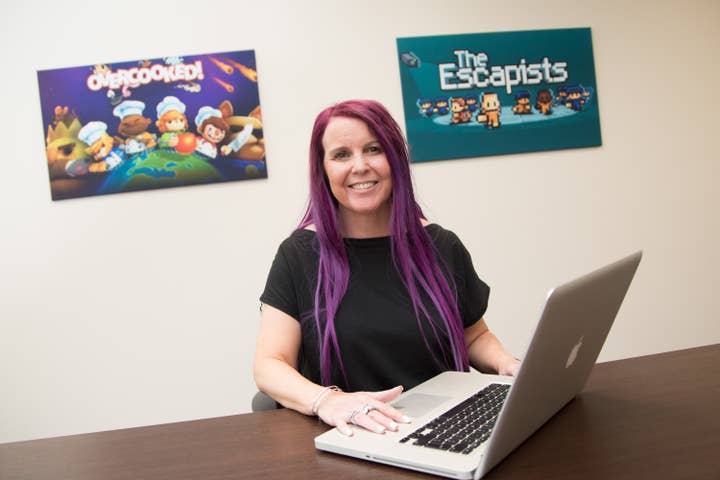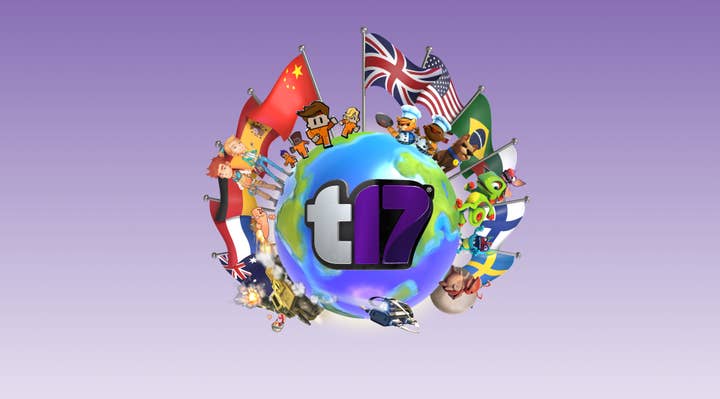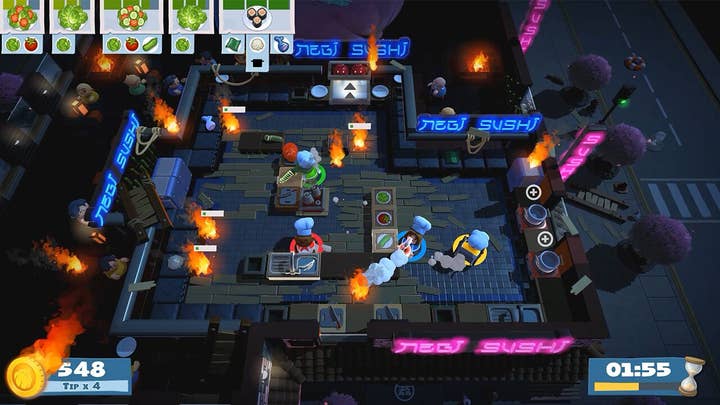Team17: Everyone is expecting us to buy a lot of studios
CEO Debbie Bestwick discusses managing expectations following her company's IPO
Team17 has a slightly contradictory feeling about being known as 'that Worms company'.
On the one hand, it's simply not true anymore. Whereas in 2013 Worms was the company's biggest revenue generator by a long mile, today the situation is reversed. Worms is still as lucrative as it's ever been, but the arrival of The Escapists, Overcooked, Yooka-Laylee and the rest from the indie developers they work with means the company is no-longer reliant on one franchise. In fact, 50 per cent of Team17's business came from owned IP in 2017, and the other half came from third-party games that it published.
Yet at the same time, Team17 is the Worms company. It makes the game and the public know it. The franchise has been published by numerous companies through the years - Ocean, Microprose, Hasbro, THQ, Ubisoft, Sega - but it's always been a Team17 game. That recognition is something that CEO Debbie Bestwick has placed at the heart of her company's publishing initiatives.
"The amount of people who didn't realise we were even involved in Overcooked or Yooka-Laylee... that's how it should be"
"The amount of people who didn't realise we were even involved in Overcooked or Yooka-Laylee... that's how it should be," Bestwick tells us from Team17's newly expanded publishing office in Nottingham. "That's not to say we don't care about our brand. But as a consumer do you really care who is the publisher of X, Y and Z in your game or music collection? No. You care about the artist. What we're trying to do is put them at the forefront.
"When we started our label [in 2013] I had a vision to approach publishing in a completely developer-centric way, based on our experiences from working with publishers over the previous decade. I was inspired by the music industry's artist-first approach, and I liked the way ZeniMax [Bethesda's parent company] worked, where it acts as an umbrella, with great IP and creators under that. We want to work with the best developers who can make the most of our resources."
That ambition has received a significant boost in the last few months following Team17's successful floatation on the London Stock Exchange. The new investment means it can now expand significantly and acquire more IP and businesses - just like it did with The Escapists and its developer Mouldy Toof in 2016. It could even, if it wanted to, begin investing in AAA games as opposed to the indie titles that it specialises in.

"AAA is not something we want or are looking at," she says firmly. "One under-performing AAA product and you've had a bad year. That's super high-risk. The quality of the games on our label... it's something we call premium indie. It's why we have so many that have now done seven figures. But we are doing it in a cost-effective manner. You are not going to see us go out there and pick up a £20 million project any time soon."
She continues: "Don't forget where some of the biggest IPs in our industry started. A large portion started as indies with small teams. Tomb Raider was a small group of folks down the road from us in Derby. Grand Theft Auto, Minecraft... a small team again. That's where they start.
"You are not going to see us go out there and pick up a £20 million project any time soon."
"We are content creators and we are helping other content creators make games, build businesses and develop brands long-term. The IPO hasn't fundamentally changed this. We are of course thinking about long-term growth, too, but doing it in the right way for us.
"Everyone is expecting us to go out there and buy lots of studios and to do this merger or that acquisition. The biggest job I have is managing everyone's expectations. Why would we change what we're doing when it's delivering such great growth? We will acquire more IP - existing and new IPs - as we're going through things, but it must be right for our partners, for people out there in the world, and ourselves. We are not huge about taking over people's IPs. It is not the most important thing for me. But we are interested in exploring discussions where it makes sense.
"The other area people often ask is if we plan to add more development capacity. We do, but we prefer to do it organically. We've doubled our headcount in the last couple of years. We have a great culture, so it needs to be right. How many M&A businesses do you see fail? You have to find the right cultural fit."
Bestwick wants to make it clear that it isn't that Team17 lacks ambition, but it won't change the plan that got it this far. But how far can that plan take the company? Not since Eidos has the UK had a major, global third-party games publisher, and as a journalist I want to hear her bullishly declare that Team17 will fill that void and become the UK's answer to Ubisoft.

It's not that Bestwick doesn't dream of achieving that, either. It's just that it will happen progressively, and not by buying expensive AAA studios and building an Assassin's Creed-sized project.
"I am a big fan of Ubisoft," Bestwick says. "When I first visited it was a mail order company. I was 18 and they were on the outskirts of Paris. They were importers and exporters for some of our Amiga games, so who knows where we might end up? I love the type of games that we have and the way that we're doing things. We will just keep focused on great content. Nothing is more important. If you get that right, and you're working with great people, everything else comes."
"I am a big fan of Ubisoft. When I first visited them, they were a mail order company"
Team17's decision to go public was partly driven by the firm's ability to grow game sales over time. The era of contrasting financial years depending on the release schedule is at an end, something aided by the growth of digital over physical.
"We actually sold more copies of The Escapists and Overcooked in their second year than we did in their first; back-catalogue is big business for us now. It has given us better visibility. There's no reset button to zero on the 1st of January each year."
When I first started talking to Bestwick about publishing games back in 2013, she'd often mention how she would play a game, love it and sign it straight away. That sort of thing hasn't happened for a few years now. Today, Team17 has a full greenlight department, with a team of experts in production and commercial.
"Last year we looked at over 600 titles. Some really great games. We signed 9 of them," Bestwick explains. "Nobody wants to miss anything. Nobody wants to pass on the next big thing. We play every single game that comes in, no matter what it is.
"Once we have found a game that we believe has the potential, we then start to dig deeper and analyse the game from both a commercial perspective and a production point of view. The commercial analysis is where we'll show [the partner] a best, medium and worst-case scenario. And we look at if they are still sustainable even in the worst-case. Not everyone will listen to you, and we won't always get everyone right, but we want to do it in the right manner.
"The UK has created some of the best IPs in gaming, but we don't have the best track record of retaining ownership of them"
"The production analysis goes deeper into the tech side of things and helps to identify any potential risks to the project from a development and functionality perspective. All of this helps us assess what we believe the partner may need to get the game finished in terms of additional resources. Only after that does the game gets signed. Our greenlight is probably the most thorough greenlight you'll ever come across."
Although it sounds complicated, the whole process can take as little as a week (and no longer than three weeks) to complete. And the team have turned it around in 24-hours before.
"The purpose of it is ensuring that we're responsible. We want to develop and build new studios, let them keep their IP, and create long-term businesses."

It all sounds very honourable, and therefore certain to confuse some of Bestwick's new financial backers. Yet over the course of our conversation, it's clear that she means every word. It's important to her that these external studios can become bigger and more successful.
Part of this is to benefit the wider UK games scene. And not just in terms of development, but publishing, too. The UK scene hasn't had a big home-grown British publisher for almost a decade, and even some of the biggest international companies have begun to reduce their local sales and marketing teams - companies like EA, Sega and Nintendo.
Bestwick believes that if Team17 and its peers are careful in how they develops brands and support developers, then it can arrest the downward trend, and even create new jobs in a part of the industry thought to be in terminal decline.
"We've already seen global publishers consolidating publishing roles and resources to create regionalised structures. That's why I'm protective of the UK. I feel I have a responsibility to support it. It's important that our HQ is here, and we are growing businesses - not just ours - because these are jobs that are being created within the UK.
"Historically the UK has created some of the best IPs in gaming, but we don't have the best track record of retaining ownership of them. Many are owned overseas now, and some are even developed overseas. The revenues for these British-created IPs are not booked in the UK. And it's not just the games industry that loses out. The local economy is not seeing the full value of a British creation.
"What will this picture look like in ten years if we don't do something about it?"
